His favourite author is Raymond Chandler; he loved Holmes since high school when he sold self-produced comics to his classmates: for the first time Estleman gives an interview in Italy about his unconditional love for Sherlock Holmes: “Arthur Conan Doyle – he explains – enchants me and makes me envious”.
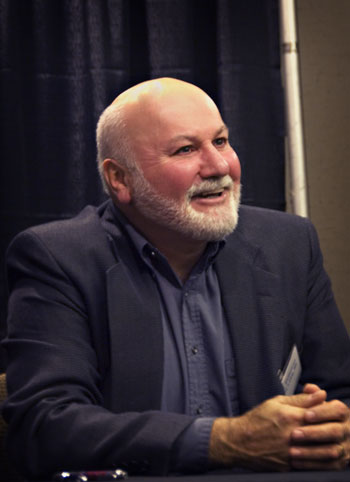
What definition would you give of the character of Sherlock Holmes?
Mercurial, arrogant, impatient, fearless, and intensely loyal to his only friend.
In your opinion, why a detective of the Victorian era became one of the most famous characters in the world?
At the time, the English were voracious readers. There was almost no competition to books and periodicals in the entertainment world. People crowded the bookstalls eagerly awaiting the latest contribution from the pen of a popular writer. Detective fiction—and for that matter, real-life detectives—were something new, offering strong characters, sparkling dialogue, challenging plots, romance, and adventure. Some writers provided some of those things; Sir Arthur Conan Doyle provided them all, and so convincingly that many accepted—and still accept—Holmes and Watson among them as flesh-and-blood people.
Sherlock Holmes is an hero?
Very much so. Despite early impersonations by stodgy actors, he was a man of action as well as intelligence; youthful, athletic, and courageous, to a degree that sometimes catapulted him so deep into harm’s way it fell upon Watson to come to his defense. And Holmes’s sense of justice frequently took him outside established authority, placing compassion before the law. He was as much a vigilante as Batman, which appeals to the revolutionary in all of us.
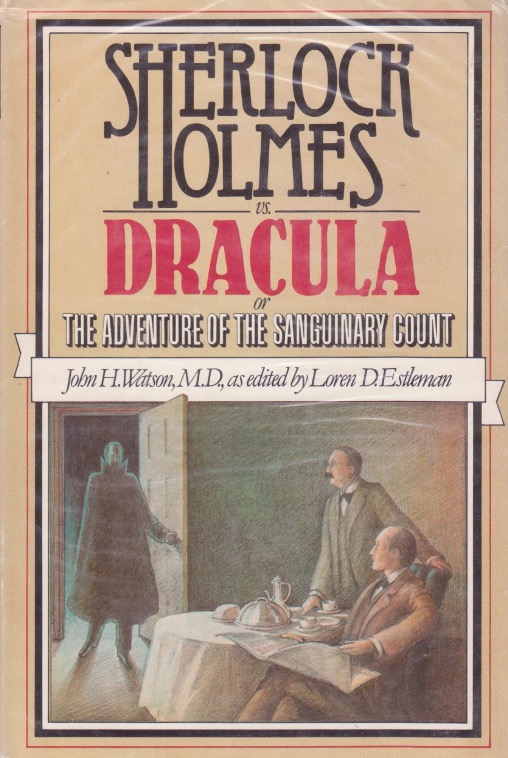
What fascinates you about Arthur Conan Doyle’s stories?
Their ability to plunge the reader into another world, often with the opening line. As a reader, I’m enchanted. As a writer, I’m envious.
What is the story of the Canon you love the most and why?
For me, it’s a tie between “The Man with the Twisted Lip” for its ingenious and ironic solution and “The Speckled Band” for its drama, tragedy, and delicious retribution.
How did you start writing apocrypha?
In junior high school. In those days I manufactured my own comic books, writing, drawing, stapling the pages together, and selling them to classmates. When A Study in Terror, quite a good movie pitting Holmes against Jack the Ripper, was released, I thought it odd that someone would place a fictional and a historical character in the same story, and got wondering which contemporary fictional character would make a good foe for Holmes. I hit upon Bram Stoker’s vampire king, and whipped out a comic called Sherlock Holmes Meets Dracula. Many years later, when my writing career was just getting started, the success of Nicholas Meyer’s The Seven Percent Solution reminded me of that old project. The result was Sherlock Holmes Vs. Dracula, orThe Adventure of the Sanguinary Count, which has rarely been out of print since it was first published by Doubleday in 1978. I might add that researching Conan Doyle’s stories for that first adolescent project was what made me a lifelong fan.
What kind of difficulties you encountered in writing new stories dedicated to Sherlock Holmes?
In the beginning, I had to steep myself in Conan Doyle in order to assimilate his distinctive style, which is quite different from my own. I’d start every day by reading one of the fifty-six Holmes stories or part of one of the four novels, then hurl myself into the writing while the influence was still fresh. More lately, however, I find that I can switch it on and off. That comes only from practice. Also, I had to resist the temptation to recycle Holmes’s favorite expressions, or to re-stage a celebrated scene, such as his humorous encounter with the man who owned Toby, the tracking dog he borrows in The Sign of Four. It’s more challenging—and more fun, when successful—to create new scenes and phrases that would suit Holmes without tramping over old ground.
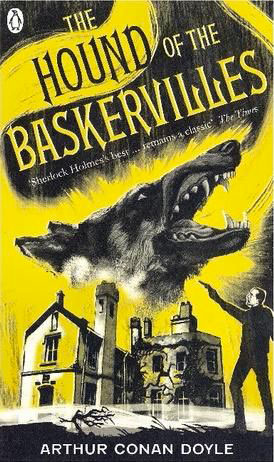
Who is your favourite character in the Canon?
Professor Moriarty. I’m certain I’m in the majority in that. What’s more satisfying to a suspense fan than an arch-villain?
What was the reaction of the fans to your novels? Have you ever received any “scolding”?
I tapped into two major reservoirs of interest to aficionados of Holmes and of Dracula, so the sales have always been pleasant. The reviews were widespread and generally good (no pans that I’m aware of.; although one snarky critic of Jekyll smugly predicted that I was no doubt engaged in throwing Holmes and Fu Manchu into the pit; since I was contemplating doing just that, I abandoned the idea rather than prove him right. Years later, Cay Van Ash pulled off the feat in Ten Years Beyond Baker Street.). I’ve never heard from anyone who disapproved. As a matter of fact, when the late Dame Jean Doyle Bromet, Sir Arthur’s daughter, declared a moratorium on Holmes pastiches (fearing the imitations would swamp her father’s memory), she excepted me from the ban. I took that to mean that she approved of my respectful treatment of the creator’s work. I’d like to point out that all my pastiches were approved by the executors of the Arthur Conan Doyle literary estate, and that the proceeds were shared with that body.
Which apocryphal of other author do you love most?
I admire Nicholas Meyer, whose Seven Percent Solution painted a thoughtful portrait of a ninety-year-old Watson recalling Holmes’s relationship with Sigmund Freud; in addition, it was a rollicking adventure and a spot-on tribute to Conan Doyle’s style, leavened with the melancholy hard-won wisdom of a man nearing the end of his life remembering an incident from far in the past. Today, I look forward to Laurie R. King’s stories about Holmes in retirement as recounted by his new young wife, and Carole Nelson Douglas’ adventures featuring Irene Adler, the only woman (the only person, in fact), to outwit Holmes.
How did your two apocryphal novels and stories come about?
Encouraged by the success of Sherlock Holmes vs. Dracula, I cast about for another contemporary character to throw into the ring with Holmes. Dr. Jekyll and Mr. Holmes was a slam-dunk, and proved nearly as popular as the first book. (The editor, the late Cathleen Jordan, recalling her difficulties dealing with the infuriating person who at the time represented the Conan Doyle estate, said she had to walk around the block to cool off after learning the subject of my next book; later, my agent, Ray Puechner—also since sadly deceased—said, “If the next one’s a Professor Challenger story, I’ll kill you.”) Years after, the late Martin H. Greenberg invited me to contribute Holmes stories to a number of anthologies; I never turned him down, as the writing was fun and the royalties almost instant. When I had enough titles to reprint in a collection of my own, two TV series and big-screen movies based on Conan Doyle’s characters had scored big with viewers, so The Perils of Sherlock Holmes was an immediate hit.
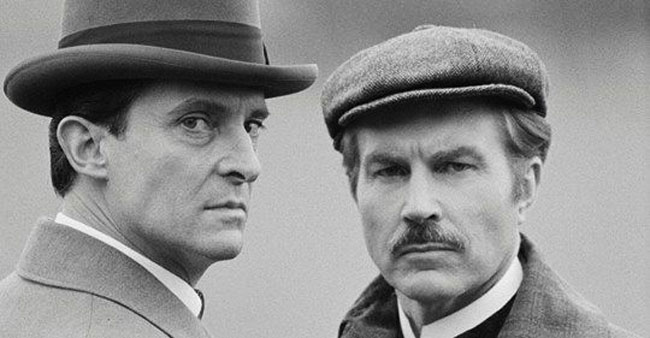
Are you planning to write other novels or short stories dedicated to Sherlock Holmes?
Let’s say I’d be more surprised if I didn’t than if I did.
What is the first story or novel you would recommend reading to those who have never read Sherlock’s adventures?
The Hound of the Baskervilles. I’d match it against anything in the contemporary suspense genre.
What do you think of modern transpositions like “Sherlock” or “Elementary”?
Although I’m a purist who prefers to see Holmes in his historical period, I haven’t forgotten that until Basil Rathbone starred in The Hound of the Baskervilles, Hollywood had always presented him as a contemporary character—and in fact eventually transported Rathbone’s Holmes from the Victorian era to World War II. I enjoy both television series tremendously, particularly how cleverly the writers wove characters and events from the original stories into a twenty-first-century setting.
Which actor in the history of Holmes’ film transpositions has interpreted him best?
Jeremy Brett. He wasn’t afraid to bring Holmes’s less endearing characteristics to the role, making him far more fascinating than just the “good guy” and allowing Watson (as played by David Burke and Edward Hardwicke) to come into his own as a gentling factor, contributing the compassion Holmes lacks.
What was the scene you loved most about writing in your Sherlock novels?
The moment in Holmes vs. Dracula when Watson says, “You’ve charted a dangerous course,” and Holmes replies, “One hour at sea and already your speech is becoming nautical.” It struck me then that I’d mastered the Doyle/Watson style to the point that it had become natural..
Which of your two novels dedicated to Sherlock are you most fond of and why?
It’s impossible to choose. I was proud of being able to thread my story into Stoker’s Dracula, with its strict timetable established through letters, journals, and dictaphone recordings, taking advantage of the long passages in which none of the vampire hunters knows what the Count’s up to (he was fencing with Holmes, of course), and the cerebral structure of Dr. Jekyll and Mr. Holmes, in which the detective unlocks the mystery of Jekyll by reading the same books he’d read that brought him to the invention of the formula that turned him into Mr. Hyde—in effect, tracking him through the labyrinth of the human mind. (It was so cerebral, in fact, that I felt the need to inject a slapstick hansom-cab chase across London in order to attract Hollywood interest in the book; not that it succeeded.)
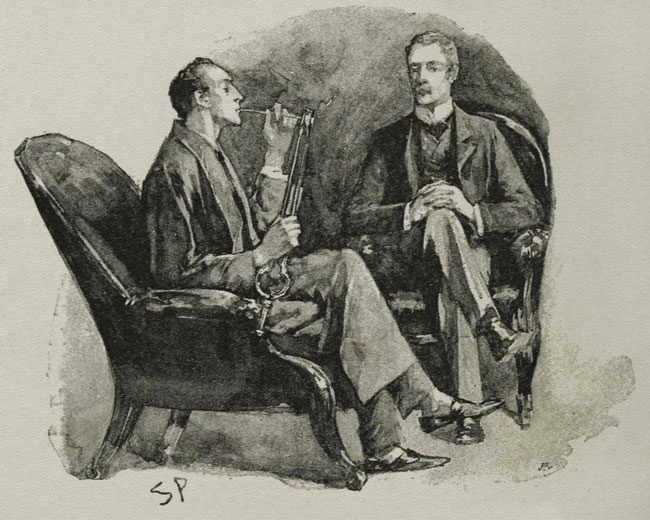
What do you think is the best mystery writer in history?
Raymond Chandler. More than any other author he broke down the barriers between detective fiction and world literature.
What are you currently working on?
Recently I turned in a new Amos Walker mystery, When Old Midnight Comes Along, that will be published in November. I’ve just finished a new Valentino, film detective, novel, and am writing a historical novel of suspense that’s a bit outside my usual bailiwick. This late in my passage, I find the challenge an exhilarating experience.


